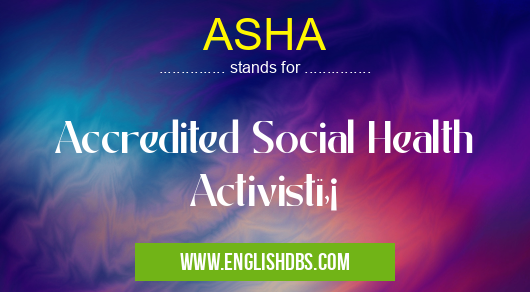What does ASHA mean in HEALTHCARE
ASHA is an acronym for Accredited Social Health Activist. ASHA is a community-level health worker in India who acts as the first contact point between the Indian government's public health system and the communities they serve. As part of the National Rural Health Mission (NRHM), ASHAs are trained and accredited to provide primary healthcare services at a grass-roots level in India's rural, semi-urban and urban areas. The ASHA workers act as frontline health care providers that link local communities to more comprehensive primary, secondary, and tertiary healthcare services provided by comprehensive government schemes such as Rashtriya Swasthya Bima Yojana (RSBY), Janani Suraksha Yojana (JSY) and Pradhan Mantri Suraksha Bima Yojana (PMSBY). The focus of ASHAs is on promoting maternal and child health, improving access to family planning services, providing immunization services, managing non communicable diseases, preventive healthcare and providing health education on a variety of topics from nutrition to hygiene. They also provide guidance in enrolling women into government sponsored welfare policies such as Mahatma Gandhi National Rural Employment Guarantee Act (MGNREGA) and Antyodaya Anna Yojana (AAY). By providing support for improving the well being of communities at a grassroot level, ASHAs play an important role in reducing poverty levels in India.

ASHA meaning in Healthcare in Medical
ASHA mostly used in an acronym Healthcare in Category Medical that means Accredited Social Health Activistï‚¡
Shorthand: ASHA,
Full Form: Accredited Social Health Activistï‚¡
For more information of "Accredited Social Health Activistï‚¡", see the section below.
» Medical » Healthcare
Essential Questions and Answers on Accredited Social Health Activistï‚¡ in "MEDICAL»HEALTHCARE"
What is an ASHA?
An ASHA is an Accredited Social Health Activist. This is a paid community health worker who implements India's National Rural Health Mission. ASHAs serve as links between their communities and local public health facilities by providing public education, health information dissemination, mobilizing communities for better health services and carrying out follow-up activities in order to ensure delivery of quality healthcare.
What responsibilities do ASHAs have?
ASHAs are expected to help improve the health of the communities they serve at the ground level. They will use various tools such as door-to-door visits, group meetings and educational campaigns to reach out to people in their catchment areas. Their duties include helping individuals access healthcare services, providing information on diseases and preventive measures, referring high risk cases to appropriate facilities and maintaining records of health services availed by people in their area.
What qualifications do ASHAs need to have?
To be eligible for the role of an ASHA one needs to have a minimum education of 8th grade pass and should be 18 years or older. In addition they must possess good communication skills, fluent knowledge of the local language & culture and strong interpersonal skills. They also need to show commitment towards their job by actively participating in training programmes conducted by the government or NGOs on topics related to health & nutrition.
What kind of support does an ASHA get?
As part of India’s National Rural Health Mission (NRHM), each hired ASHA typically receives some form of remuneration from government or other agencies they are linked with along with medical kits which are used while conducting field visits in their catchment area. In addition they receive basic hands-on training such as first aid, antenatal care, identification & reporting cases related diseases etc.
How does an ASHA benefit her community?
By having somebody like an ASHA present in rural areas it becomes easier for people living there to access healthcare services that would otherwise be beyond reach due to a lack of awareness about available resources or transportation difficulties caused by location and financial constraints. An active network consisting of trained workers like these can make a difference in lives not just through better utilisation but also in terms of early detection & treatment leading to better management outcomes over time.
Is there any formal certification involved for being an Accredited Social Health Activist?
Yes there is – accredited social health activists (ASHAs) must receive accreditation from District Level Quality Assurance Committee organized by NRHM as partof this process important aspects such as patient counselling skills are assessed
Final Words:
The work of an ASHA is vital to ensuring good public health standards at multiple levels in India; it helps to bridge the gap between people’s access to healthcare facilities, services available and their rightto quality healthcare services. With their help grassroots level communities can benefit from improved access to essential medical supplies like vaccines for children; better knowledge about preventive practices like nutrition or waste management ;efficient referral systems which allow them get treatment from more specialized care centers AND so much more. It has been observed that when there is proper implementation of the NRHM project through its designated community workers like ASHAs, there have been tangible benefits seen both by people living below poverty line who need good Healthcare facilities but don’t have the means to get them AND by society as a whole due emergence of healthier populations that increase productivity of labor force & gives impetus to economic development also!
